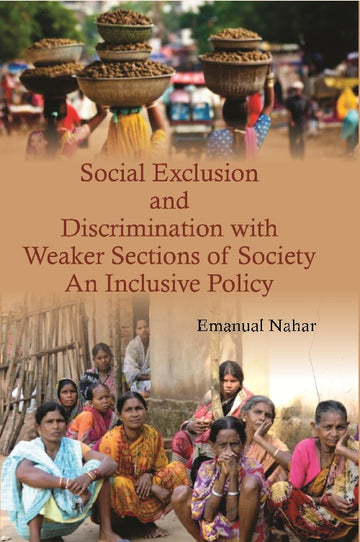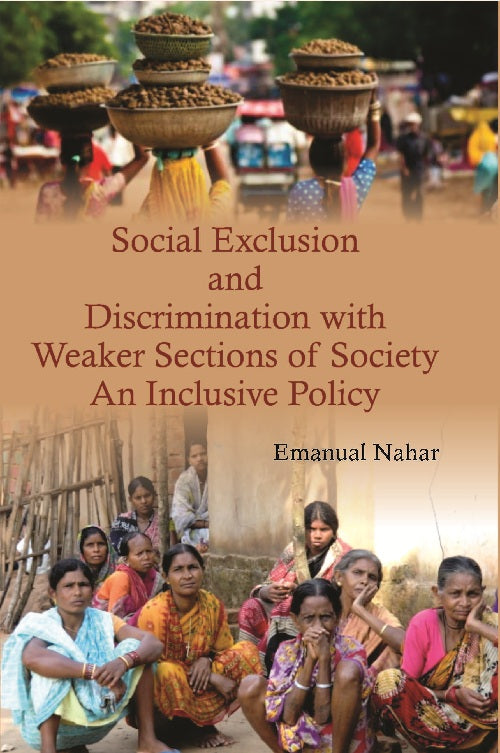Social Exclusion and Discrimination With Weaker Sections of Society : an Inclusive Policy
Regular price
₹ 921
Sale price
₹ 921
Regular price
₹ 990
Unit price
Save 7%
| Item Weight | 400 Grams |
| ISBN | 978-9351281979 |
| Author | Emanual Nahar |
| Language | English |
| Publisher | Kalpaz Publications |
| Pages | 322 p |
| Book Type | Hardbound |
| Dimensions | 25 X 15 X 5 |
| Publishing year | 2016 |
| Edition | 1st |
| Return Policy | 5 days Return and Exchange |

Social Exclusion and Discrimination With Weaker Sections of Society : an Inclusive Policy
Product description
Shipping & Return
Offers & Coupons
ABOUT THE BOOK:- The processes of exclusion and hierarchy in society, is embedded deeply in the historical, cultural, and social web, especially in the context of India. Excluded groups of the society continue to be the disadvantaged, distressed and vulnerable part of the society. There is need of egalitarian society in today's times. The elimination of social exclusion should be scheduled for democratic India. Therefore, confiscation of forms o f discrimination is the most important assignment to be performed before an inclusive society is reconstructed. This is also the most democratic task of all since it is call to establish a society based on equality: social, political and perhaps economic too. This book focuses on various forms of exclusion and inclusion strategies run by the state to include the communities or groups to the mainstream of society. This book will be useful for readers, research scholars, and academicians interested in Dalit studies, minority studies, social exclusion and Inclusive policy studies. ABOUT THE AUTHOR:- Prof.Emanual Nahar is working, at present in Department of Political Science, USOL, Panjab University, Chandigarh. He obtained his Doctorate in Political Science from Panjab University, Chandigarh. He has specialization on 'Minority and Dalit Politics' and 'Foreign Policy'. He is present Director/Coordinator, Centre for the study for the Study of Social Exclusion and Inclusive Policy, Dr. Ambedkar Centre and Post Graduate Diploma in Human Rights and Duties, Panjab University, Chandigarh. He remained member of Research Degree Committee, Panjab University, Chandigarh. He is member of Senate and Syndicate, Panjab University, Chandigarh. He has been supervising M.Phil., Ph.D. research scholars and has published many books and articles in reputed Journals. He is recipient of prestigious awards (Thorpe's and William Carry Award) in the field of education. He is member of many educational bodies/institutions. CONTENTS:- Foreword . 9 List of Contributors . 11 Towards Inclusive Policy: Cultural, Political and Economic Deterrents . 13 1. Politics of Social Exclusion: A Study of Dalit Christians in the State of Punjab . 23 —Priyanka and Emanual Nahar • Abstract • Introduction • Socio-Economic Profile: A Study of Christians • Socio-Economic Exclusion • Politics of Exclusion and Dalit Christians • Christians in the State of Punjab • Conclusion • References. 2. Return of Kashmiri Pandits: Problems of Perceptional Divergence and Trust Deficit . 35 —Suman 3. Religion and its Interactional Dynamics: A Study of Changing Contours of Tribal Community . 49 —Sipra Sagarika • Abstract • Introduction • Sociology of Religion • Anthropology of Religion • Tribal Religion: In Anthropological Lensing • Demography of Tribal Population in India • Tribal Religious Identity Issues • Identity Issue • Tribal and Hindu Interactions • Impact of Buddhism and Islam on Tribal Religion • Conclusion. 4. Inclusive Policy Approach on Disabled Persons: A Core Concept of Human Rights . 61 —Amritpal Kaur • Abstract • Introduction • Suggestions • Conclusion. 5. Political Marginalisation of Scheduled Castes in Elections to General Constituencies of Punjab Vidhan Sabha - A Case Study of 2007 and 2012 Elections . 73 —Kamla • The Brief Backdrop and Research Methodology • Reasons and Remedies. Social Exclusion 6 and Discrimination with Weaker Sections of Society 6. Ambedkar’s Quest of a Mere Democratic India . 83 —Nirmal Singh • Dr Ambedkar’s View on Caste System • Ambedkar’s Vision Social Democracy • References. 7. Women with Disabilities: A Politics of Exclusion . 93 —Kanchan Chandan • Abstract • Review of Literature • Case Studies • Analysis • Conclusion • References. 8. Sex Preference and the Value of Sons and Daughters in India . 105 —Manjinder Kaur • Abstract • Introduction • Family Size and Sex Preference • Value of Children • Mortality • Conclusion • References. 9. Violation of Human Rights in Unorganised Sector: A study of excluded group of Migrant Labour in Punjab . 119 —Sucheta Singh • Introduction • Contributions of migrants • A human rights approach to migration • Some glimpse of Ground Realities • Issues Pertaining to Human Right Violation • Conclusion • References. 10. Revisiting Delhi Gang Rape: Strategizing gender empowerment at linguistic level. 127 —Nirat Pandey • Abstract • Introduction • Goal of the Paper • Methodology • Theoretical Framework • Method • Qualitative Analysis • Framing of victim • Framing of Accused • Framing of Fear • Framing of a city • Deductions • Framing of victim • Framing of Accused • Framing of Fear • Framing of city • Conclusion • References. 11. Between “Exclusion” And “Unfavourable Inclusion”: Realising the Right to Food For Dalits . 159 —Tejinder Pal Singh • Abstract • Introduction – Conceptualising the Social Exclusion • Right to Food and Constitutional Mandate in India • Caste-based violation of Right to Food • Suggestions • Conclusion • References. 12. Crime against Dalit Women . 179 —Parminder Kaur • Abstract • Introduction • Insecure Indian Dalit Women • Forms and frequency of violence against Dalit women • Various issues being confronted by Indian Dalit women • Recommendations • Implement laws that prohibit bonded or forced labour • References • Website Links. 7 13. Development Projects at Odisha’s Coast and the Silent Spiriting away of Fishing Communities . 191 —Sunakar Patra • Abstract • Introduction • Marine Fishermen • Development Script • Displacement and Impoverishment • Ecological vulnerabilities • Conclusion • References. 14. IT and Gender from Social Exclusion to Social Inclusion . 199 —Ranjay Vardhan • Abstract • Introduction • Theoretical Background • Methodology • Findings • Discussion • Inclusion through Entrepreneurship • Challenges of ICT use for Women’s Social Inclusion • Training Women for the IT Workplace • Recommendations • References. 15. Gender Discrimination: The Status of Girl Child . 217 —Mona Arora • Abstract • Introduction • Health • Education • Violence against Girls • Equal Rights for Girl • Legislative Provisions Regarding Girl Child • Conclusion • References. 16. Social and Economic Status of the Marginalised Community in Dugri Village of Rupnagar Districts of Punjab with Special Reference to Scheduled Castes . 225 —Amrit Kaur • Abstract • Introduction • Scheduled Castes • Social status of Scheduled Castes in rural areas • Objectives of Study • Research Methodology • Village Profile • Data Discussion • Summary and Conclusions • References. 17. Empowerment and Political Participation of Dalit Women in Local Self Governance . 241 —Poonam Sharma • Abstract • Introduction • Panchayati Raj Institution • Issue of women’s empowerment • Dalits • Obstacles in the way of Dalit Women in Rural Areas • Contribution of various Sociologists and Anthropologists • Dalit women’s participation in politics • Suggestive measures • Conclusion • References. 18. Constitutional Prerogatives in Mainstreaming of Dalit in India . 255 —Gobinda Chandra Sethi • Abstract • Introduction • Dalit Identity • Vision of Dr Ambedkar • Constitutional Prerogatives • Directive Principles of State Policy • Social Dimension • Dimension of human trafficking, Article 23 • Religious Dimension, Article 25(2) • Educational and Cultural CONTENTS:- Social Exclusion 8 and Discrimination with Weaker Sections of Society Dimension • Political Dimension • Dimension of Reservation and Service • Statutes and Legislations • The Position of Dalits in India Today • Findings • Suggestions • Conclusion • References. 19. Politics of Religious Exclusion: Status of Sehajdhari Sikhs in the Sikh Panth . 265 —Kanwar Deep Singh • Abstarct • Introduction • Politico-Religious Exclusion of Sehajdhari Sikhs • Politicisation of ‘Sehajdhari Sikh’ Identity • Conclusion • References. 20. Political Marginalisation in Punjab Villages: A Nexus of Corruption, Factionalism and Political Distrust . 275 —Gunjan Setia • Abstract • Introduction • Major Findings • Factionalism • Corruption • Conclusion • Notes • References. 21. Are Dalits Part of Inclusive Policy of India? An overview . 285 —Navneet Kaur • Abstract • Introduction • Brahmanical Structure of Indian Society • Caste in Contemporary India • References. 22. Ageing and Social Exclusion: The Gauntlets and Requisite Bucklers for the Elderly in 21st Epoch . 293 —Rupinder Aulakh • Abstract • Introduction • Various Thespians Responsible for bouleversement fostering Social Exclusion • Impact of such bouleversement on elderly and society • Conclusion • References. 23. Land Acquisition for SEZs: An Issue of Socio-Economic Exclusion. 307 —Manish Kumar • Abstract • The National Rehabilitation and Resettlement Policy, 2007 • Land Acquisition and Rehabilitation and Resettlement Bill (LARR), 2011 • References. Index . 317 The Title 'Social Exclusion and Discrimination With Weaker Sections of Society : an Inclusive Policy written/authored/edited by Emanual Nahar', published in the year 2016. The ISBN 9789351281979 is assigned to the Hardcover version of this title. This book has total of pp. 322 (Pages). The publisher of this title is Kalpaz Publications. This Book is in English. The subject of this book is Sociology. Size of the book is 14.34 x 22.59 cms Vol:-
- Sabr– Your order is usually dispatched within 24 hours of placing the order.
- Raftaar– We offer express delivery, typically arriving in 2-5 days. Please keep your phone reachable.
- Sukoon– Easy returns and replacements within 5 days.
- Dastoor– COD and shipping charges may apply to certain items.
Use code FIRSTORDER to get 5% off your first order.
You can also Earn up to 10% Cashback with POP Coins and redeem it in your future orders.








